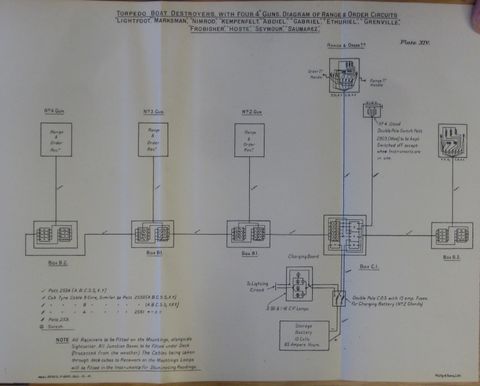Lightfoot Class Flotilla Leader (1915)
The seven flotilla leaders of the Lightfoot Class (sometimes referred to as the Marksman Class) were completed in 1915-16.
| Overview of 7 vessels | |||||
|---|---|---|---|---|---|
| Citations for this data available on individual ship pages | |||||
| Name | Builder | Laid Down | Launched | Completed | Fate |
| Kempenfelt | Cammell Laird | 1 May, 1915 | |||
| Lightfoot | J. Samuel White | 28 May, 1915 | |||
| Marksman | Hawthorn Leslie & Company | 28 Apr, 1915 | |||
| Nimrod | William Denny & Brothers | 12 Apr, 1915 | |||
| Abdiel | Cammell Laird | 12 Oct, 1915 | Jul, 1936 | ||
| Gabriel | Cammell Laird | 23 Dec, 1915 | 9 May, 1921 | ||
| Ithuriel | Cammell Laird | 8 Mar, 1916 | 8 Nov, 1921 | ||
Contents
Machinery
Generators
In 1916, it was stated that flotilla leaders have two 26.25 kw dynamos arranged in parallel with an additional 9 kw oil-fired set for emergency use.[1] It is fairly likely that this applied to this earlier class.
Armament
Guns
- Four 4-in Q.F. Mark IV guns on P. IX or C.P. III mountings.[2]
Torpedoes
- Two double revolving 21-in torpedo mounts.[3]
In 1917, at least Ithuriel was using 21-in Mark II***** torpedoes.[4]
Fire Control

By the end of 1915, at least, the ships had or were to be provided a range and order data system like that being given to the "M" class destroyers and to the Faulknor class leaders.[6]
The scheme placed the combined transmitter on the forebridge, and a combined receiver near the sightsetter position of each gun. Ranges from 0 to 9900 yards in increments of 100 yards, and orders were "Independent", "Control" and "Fire" with illuminated indicators and a red indicator on the receivers to signal loss of power from the battery pack located below decks.
Directors
In 1917, it was approved that all flotilla leaders except Swift and Abdiel should receive installations of the British Destroyer Director Firing System,[7] it appears that none of the Lightfoots received a director.[8]
However, the Director Firing Handbook, 1917 reports that they had Small Type Training Receivers of pattern number 20 on #1, #2 and #3, and pattern number 21 on #4.[9]
Rangefinders
By 1921, all R.N. destroyer leaders mounted a 9ft F.Q. 2 on an M.Q. 1, M.Q. 9 or M.Q. 12 mount on their fore bridge.[10]
Alterations
Abdiel had long been equipped to carry mines, as she'd sown some at Horn's Reef after the Battle of Jutland. By November 1918, these were noted as being 40 "M" type sinkers. At the same time, Gabriel was also to be equipped to carry "M" type sinkers, likely in the same number. The torpedo tubes and guns removed when the mines were shipped could be placed back aboard with enough notice.[11]
See Also
Footnotes
- ↑ Annual Report of the Torpedo School, 1916. p. 120.
- ↑ The Technical History and Index, Vol. 4, Part 34. p. 17.
- ↑ The Technical History and Index, Vol. 4, Part 34. p. 17.
- ↑ Annual Report of the Torpedo School, 1917. p. 61.
- ↑ Admiralty. Handbook of Fire Control in Torpedo Boat Destroyers of "M" Class and Later and Flotilla Leaders, 1915, Plate XIV.
- ↑ Admiralty. Handbook of Fire Control in Torpedo Boat Destroyers of "M" Class and Later, and Flotilla Leaders, 1915, p. 3, Plate XIV.
- ↑ Annual Report of the Torpedo School, 1917. p. 229.
- ↑ The Technical History and Index, Vol. 4, Part 34. p. 17.
- ↑ The Director Firing Handbook. p. 146.
- ↑ Handbook for Naval Range-Finders and Mountings, Book I. p. 168.
- ↑ Annual Report of the Torpedo School, Mining Appendix, 1917-18. p. 11. Plate 7.
Bibliography
- Admiralty, Technical History Section (1920). The Technical History and Index: Alteration in Armaments of H.M. Ships during the War. Vol. 4, Part 34. C.B. 1515 (34) now O.U. 6171/20. At The National Archives, Kew, United Kingdom.
- March, Edgar J. (1966). British Destroyers: A History of Development, 1892-1953. London: Seeley Service & Co. Limited. (on Bookfinder.com).
- Admiralty, Gunnery Branch (1918). Handbook of Captain F. C. Dreyer's Fire Control Tables, 1918. C.B. 1456. Copy No. 10 at Admiralty Library, Portsmouth, United Kingdom.
| Lightfoot Class Flotilla Leader | |||||||||||||||||||||||||||||||||||||||||||||||||||||||||||||||||||||||||||||||||||||||||||||||||||||||||||||||||||||||
| Kempenfelt | Lightfoot | Marksman | Nimrod | Abdiel | |||||||||||||||||||||||||||||||||||||||||||||||||||||||||||||||||||||||||||||||||||||||||||||||||||||||||||||||||||
| Gabriel | Ithuriel | ||||||||||||||||||||||||||||||||||||||||||||||||||||||||||||||||||||||||||||||||||||||||||||||||||||||||||||||||||||||
| <– | Faulknor Class | Destroyer Leaders (UK) | Parker Class | –> | |||||||||||||||||||||||||||||||||||||||||||||||||||||||||||||||||||||||||||||||||||||||||||||||||||||||||||||||||||